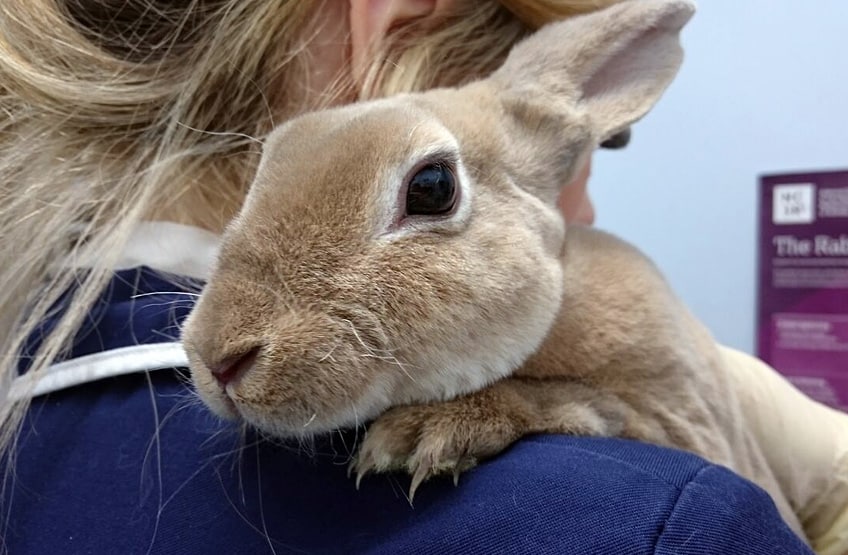Sickness in rabbits includes upper respiratory tract infections, parasites, dental disease, gastrointestinal stasis, uterine problems, and foot sores. It is crucial to seek veterinary care promptly, create a calm environment, keep them warm, encourage eating, and regularly groom and check for signs of fly strike.
Intestinal disease is a major cause of death in young rabbits and is often caused by disruptions in gut bacteria. Other infectious diseases such as myxomatosis and rabbit hemorrhagic disease also pose serious threats to rabbit health. Additionally, common diseases in rabbits include overgrown teeth, snuffles, hairballs, and uterine tumors.
Proper care and timely treatment are essential to ensure the well-being of rabbits.

Credit: www.theveterinarynurse.com
Common Sicknesses In Rabbits
Common sicknesses in rabbits include upper respiratory tract infections, external and internal parasites, dental disease, gastrointestinal stasis, uterine problems, and pododermatitis. It’s important to book a vet appointment, provide a calm environment, keep them warm, encourage eating, and regularly check for signs of illness.
Rabbits, like any other pets, can fall ill from time to time. It’s important to be aware of the common sicknesses that can affect them so you can provide them with the necessary care and treatment. Here are some of the most common sicknesses in rabbits:Upper Respiratory Tract Infections
Upper respiratory tract infections, also known as “snuffles,” are a common illness in rabbits. It is characterized by symptoms such as sneezing, nasal discharge, and difficulty breathing. These infections can be caused by bacteria, viruses, or even dental issues that lead to blockage or inflammation in the airways.Parasites
Internal and external parasites can infest rabbits and cause various health issues. External parasites like fleas, mites, and ticks can lead to skin irritation, hair loss, and even anemia if left untreated. Internal parasites such as worms can affect the rabbit’s digestive system and overall health.Dental Disease
Dental disease is another common health problem in rabbits. Their teeth continuously grow throughout their lives, and if not properly worn down, they can develop dental issues such as overgrowth, misalignment, and abscesses. These dental problems can cause pain, difficulty eating, and other related health issues.Gastrointestinal Stasis
Gastrointestinal stasis, also known as “GI stasis” or “bloating,” is a condition where the rabbit’s digestive system slows down or stops altogether. This can be caused by various factors such as a poor diet, lack of exercise, or underlying health issues. Symptoms include a decrease in appetite, bloating, and decreased fecal output.Encephalitozoon Cuniculi
Encephalitozoon cuniculi is a microscopic parasite that can infect rabbits and cause various neurological problems. The parasite can affect the eyes, kidneys, liver, and nervous system. Symptoms include head tilt, seizures, hind limb weakness, and urinary problems.Uterine Problems
Female rabbits are prone to uterine problems such as infections or cancer. These issues can cause symptoms such as vaginal discharge, swelling of the abdomen, and behavioral changes. It’s important to spay female rabbits to prevent these potential health concerns.Pododermatitis
Pododermatitis, also known as “sore hocks” or “foot sores,” is a condition where the skin on the bottom of the rabbit’s feet becomes inflamed and sore. This can be caused by prolonged pressure on the feet, unsanitary living conditions, or bacterial infections. Regular monitoring and providing a clean and comfortable environment can help prevent pododermatitis. Being aware of these common sicknesses in rabbits and taking proactive measures can help keep your furry friend healthy and happy. If you notice any symptoms or concerns, it’s essential to seek veterinary care to provide proper diagnosis and treatment.
Credit: www.caldervets.co.uk
Symptoms Of Rabbit Sickness
Rabbits can fall ill due to various reasons, and it is important for every rabbit owner to be able to recognize the symptoms of sickness to provide timely and appropriate care. Here are a few common symptoms to look out for:
Dry Eyes And Nose
- Reduction in tear production leading to dry, crusty, or irritated eyes
- Nasal discharge that is thick, discolored, or absent
- Sneezing or sniffling
If you notice any of these symptoms, it is essential to consult a veterinarian immediately. Dry eyes and nose may indicate infections or respiratory issues that require prompt treatment.
Swollen Earflaps And Genitalia
- Earflaps that appear red, swollen, or warm to the touch
- Enlarged or inflamed genitalia
- Bleeding or discharge from the ears or genital area
These symptoms may be signs of ear mites, infections, or hormonal imbalances. Swift veterinary attention is crucial to prevent complications and ensure the well-being of your rabbit.
Failure To Eat Or Drink
- Loss of appetite or refusal to eat
- Decreased water intake or refusal to drink
- Weight loss or lethargy
If your rabbit shows these symptoms, it is a cause for concern as they can lead to dehydration and malnutrition. In such cases, immediate veterinary care is necessary to identify and address the underlying cause.
Remember, early detection of symptoms is vital in preventing further deterioration of your rabbit’s health. Always consult a qualified veterinarian for accurate diagnosis and treatment of any illness your rabbit may be experiencing.
Treatment And Prevention
When it comes to sickness in rabbits, it is important to focus on both treatment and prevention. By taking the right steps, you can help your furry friend recover and prevent future health issues.
Book An Appointment With A Vet
One of the first things you should do when your rabbit is sick is to book an appointment with a vet. A veterinarian who specializes in rabbit care can provide the best treatment and guidance for your pet. They can assess the rabbit’s condition, run necessary tests, and recommend appropriate medications if needed.
Provide A Calm Environment
A calm and stress-free environment is essential for your sick rabbit’s recovery. Reduce noise and disturbance in their surroundings to help them relax. Keep them in a quiet area of your home where they can rest without any distractions. This will promote healing and aid in their overall well-being.
Keep The Rabbit Warm
Rabbits are sensitive to temperature changes, so it’s crucial to keep them warm when they are unwell. Place their enclosure in a draft-free area and provide extra bedding and blankets for insulation. You can also use a heating pad or a warm water bottle wrapped in a cloth to provide additional warmth. However, make sure to monitor the temperature and prevent overheating.
Encourage Eating
Loss of appetite is a common symptom in sick rabbits, and it is important to encourage them to eat. Offer a variety of fresh, high-fiber foods such as hay, leafy greens, and vegetables. You can also provide them with their favorite treats to tempt their appetite. If your rabbit still refuses to eat, consult with your vet for further guidance.
Grooming And Regular Checks
Grooming and regular checks are essential in maintaining the health of your rabbit, especially when they are sick. Inspect their fur, eyes, ears, and teeth for any signs of infection or abnormality. Remove any matted fur or debris that may accumulate. Additionally, check for signs of flystrike, a potentially serious condition caused by flies laying eggs on the rabbit’s body. Promptly remove any eggs or maggots and consult your vet if necessary.
By following these treatment and prevention measures, you can ensure that your rabbit receives the care it needs during sickness and promote a healthy lifestyle. Remember to consult with your vet for personalized advice and guidance based on your rabbit’s specific condition. With proper care and attention, your furry companion will be back to their hopping self in no time.:strip_icc()/Stocksy_txp212f0b970up100_Medium_861039-5a7c7dc36edd650036e204cf.jpg)
Credit: www.thesprucepets.com
Frequently Asked Questions For Sickness In Rabbits
What Is A Common Bunny Sickness?
Common bunny sicknesses include upper respiratory tract infections, dental disease, gastrointestinal stasis, uterine problems, and pododermatitis. Treatment involves scheduling a vet appointment, providing a calm environment, keeping them warm, encouraging eating, and regular grooming.
How Do You Treat A Sick Rabbit?
To treat a sick rabbit, follow these steps: 1. Schedule an appointment with a vet promptly. 2. Create a calm, stress-free environment for the rabbit. 3. Keep the rabbit warm, and provide a bonded companion when possible. 4. Encourage the rabbit to eat and groom them regularly.
5. Check for signs of fly strike.
What Are The Symptoms Of The Rabbit Virus?
Common symptoms of the rabbit virus include upper respiratory tract infections, parasites (internal and external), dental disease, gastrointestinal stasis, uterine problems, and pododermatitis. It is important to seek veterinary care for a sick rabbit and provide a calm, stress-free environment for them.
What Is The Most Serious Health Problem Facing The Rabbit?
The most serious health problem facing rabbits is intestinal disease, which is a major cause of death in young rabbits. Factors such as diet, antibiotic treatment, and disturbance of gut bacteria can make rabbits more susceptible to intestinal disease.
Conclusion
It is crucial for rabbit owners to be aware of common sicknesses that can affect these furry companions. From upper respiratory tract infections to dental disease and gastrointestinal stasis, rabbits are prone to various health problems. Seeking immediate veterinary care, creating a stress-free environment, and promoting healthy eating habits are essential in treating sick rabbits.
Regular check-ups and monitoring for signs of illness can help prevent and manage these conditions. By staying informed and proactive, you can ensure the well-being and longevity of your beloved rabbit.
